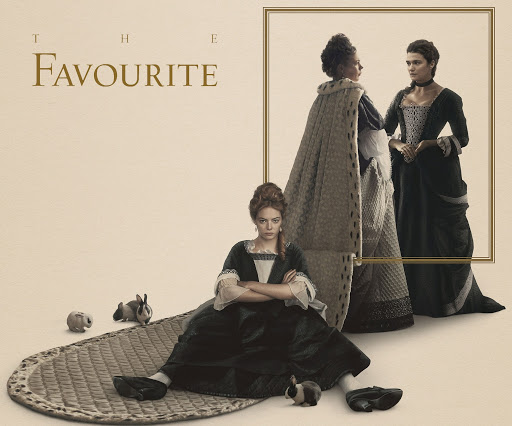
The Favourite (2018)
Director: Yorgos Lanthimos
Contemporary Greek filmmaker Yorgos Lanthimos is inclined to create worlds of his own, worlds in which the viewer feels like a complete stranger that gradually interacts with the environment, until a complete and fascinating immersion occurs. In his magnum opus Dogtooth (2009), Lanthimos invited us into a hermetic universe filled with its own codes and foreign to the outside world. In The Lobster (2015), he established socio-political and parameters and such about love, which fiercely challenge our reality.
The Favourite (2018), situates us at the beginning of the 18th century, in the palace of England’s Queen Anne (Olivia Colman). The members of the crown argue about the current situation: they are at war against France. Affected by gout and by the 17 abortions suffered during her life, Anne is a sick, fragile and irascible woman with a decadent lifestyle. Her nation remains overburdened with taxes and debts, a situation that worries Robert (Nicholas Hoult), one of the members of parliament. Anne finds a lover in Sarah (Rachel Weisz), wife of the Duke of Marlborough (Mark Gatiss), the leader of the battalion that is trying to consolidate victory in the war. Sarah’s young cousin Abigail (Emma Stone), goes to court in search of work after her family is ruined. Abigail longs for something more than being a housekeeper. She soon approaches Anne, who is in need of constant company and attention. Sarah, sensing the intentions of her perceptive cousin, seeks to shut down Abigail’s plans, but encounters a fierce opponent instead.
sick, fragile and irascible woman with a decadent lifestyle. Her nation remains overburdened with taxes and debts, a situation that worries Robert (Nicholas Hoult), one of the members of parliament. Anne finds a lover in Sarah (Rachel Weisz), wife of the Duke of Marlborough (Mark Gatiss), the leader of the battalion that is trying to consolidate victory in the war. Sarah’s young cousin Abigail (Emma Stone), goes to court in search of work after her family is ruined. Abigail longs for something more than being a housekeeper. She soon approaches Anne, who is in need of constant company and attention. Sarah, sensing the intentions of her perceptive cousin, seeks to shut down Abigail’s plans, but encounters a fierce opponent instead.
The film functions as a great chess game in which each character has very specific roles. There are graceful horses, lustful knights, great towers, bishops, and a war that seems to be a long way from the events of the palace. But, who is in charge of moving and protecting the queen? The two unscrupulous cousins. Being devoid of a male lead, the yearning for dominance subtly emanates from these female figures, willing to do anything to penetrate the realm of the queen’s private and intimate world. At first, the feud between Sarah and Abigail essentially seems to be a glorified drama of two vain and brat girls, but it soon turns into a complex, disturbing and refined dialogue. Their rivalry is encouraged by Anne, who, despite being the ruler of a great empire, is also a lonely and fragile figure, which goes from room to room with her swollen leg and intemperate presence. The unstable behavior of the three figures cannot only complicate and alter their desires, but also the path of war and the destiny of a nation. The three women form an erotic love triangle subjugated by jealousy and interests that each one hides in the abyss of her own minds. The cruel universe carries the protagonists through the traps of seduction, domination, and submission.
presence. The unstable behavior of the three figures cannot only complicate and alter their desires, but also the path of war and the destiny of a nation. The three women form an erotic love triangle subjugated by jealousy and interests that each one hides in the abyss of her own minds. The cruel universe carries the protagonists through the traps of seduction, domination, and submission.
The universality of the situations turn the movie into a contemporary and instant delight. Lanthimos doesn’t faze with the vigor of his previous films, he opts for linearity and a targeted provocation in search for a wider audience. He places his vision in an exclusive circle dominated by impulses and deformed by power, leaving a mark that provokes, hurts and insinuates. “Power,” says Lanthimos, is “the most stark form of love”. So, in this fight for the favor of an indecisive monarch, every executioner becomes a victim, and vice versa. There is much more than greed and ambition in the struggle for Abigail’s rise and Lady Marlborough’s control of the political scene. It all converges into a brilliant drunkenness of meanness and villainy, a sentimental ode to the most mundane and earthly instincts.
Lanthimos presents a vibrant and pulsating feminist story, which questions the identity of women before their rights were included in any political or intellectual forum. It may seem that feminism evaporates at times, especially when attending to the cruel environments where women confront each other with Machiavellian schemes. But leaving aside the preconceived false theories about the wild female greed, it is worth noting that this mean and twisted superficiality hides a single and crucial goal: survival. While the power and social positions of men were taken for granted, women always fought to earn a specific status. For this reason, both Sarah and Abigail know that there’s only one place beside the queen. The merciless destruction of the adversary can only be reached by obscure paths. Even in those moments of delirious provocation and comic perversion, the actresses are able to maintain absolute coherence in the incarnation of their characters. The male characters are portrayed as ridiculous and banal, they wear makeup, blush, lipstick and heels. This characterization of male figures immediately enriches the whole feminist concept. Any piece of art that claims to do justice to women must portray them as human beings; show that there are all kinds of women in the same way that there are all kinds of men, and that female characters have the right to be terrible people.
by Octavio Carbajal González

I’ve stayed away from this movie so far 🙂 but considering watching it after reading your review!
Always a pleasure to read your well-thought out reviews.
Thank you for the support, Swaha. This film might be an initial turn-off due to some popular prejudices: scenarios, costumes, historical landscapes, etc. But trust me, it’s a great experience. I applaud your taste in film!
Octavio,
I admit I disliked Dogtooth and The Lobster, but your multilayered, perceptive review of The Favorite has compelled me to view this film.
Hey Mark,
I’m surprised about your opinion towards Dogtooth and The Lobster, those two have always been in my list of favorite movies. Anyway, Lanthimos style tends to be extremely divisive.. same thing happens with Von Trier, Haneke and Gaspar Noé.
Octavio and Shawn,
I’m sorry I missed your replies to my comment. I suppose it is this director’s style of how he presented the characters in Dogtooth that I disliked. However, you both raised important points about the underlying thematic provocations.
Thanks for your kind words, hope you enjoy this film!
Hi Mark. Regarding Dogtooth. I thought you would have enjoyed this film. I found it to be powerful and important. It really turned my head around. Particularly living in the US empire and see how isolated we can sometimes be in regards to the rest of the world. Anyway, it’s all good. Hope you are well in 2021.
Awesome movie, but a bit too sexual in my opinion. Just too much of sickening sex, which degrades the movie a bit. Great review👍
Thanks, Jan!..
Wicked sex has always been an ingredient in the director’s filmography. There’s always a kind of evil/animalistic morbidity behind it. In my opinion, that resource didn’t felt forced in this film.
Hey Shawn, I’m glad you’re on board with the work of Lanthimos, his films are contemporary gems.. He portrays humans as the weird creatures we are.
I understand, it’s kinda hard to generate empathy with the main characters of this film, their intentions are unsettling. However, the main story gets more and more heated, until some attitudes finally start to make sense. By the way, I definitely need to rewatch Barry Lyndon, it definitely shares similarities with The Favourite’s cinematography, costumes, symphonic score and development.
Thanks for the kind words, glad you enjoyed the read!.
When women act mean and psychotic it’s good because it’s about “survival”.
Ha. Ha. Ha.
*ironyoff*
#theageofbullshit
Each one decides how to interpret thoughts and ideas ✌️
Great review as usual, my friend!
I always enjoy your insights a lot…
I admire Lanthimos, and I’m glad you covered his most important films on here, like the incredible Dogtooth and Lobster. With “The Favourite” Lanthimos rather elegant paved his way to more conventional Hollywood film and success, but as conventional as the film is, he still manages to squeeze in a bit of his absurd, sick ideas. Olivia Coleman was the absolute hit for me, awesome (the other two actresses I never enjoyed too much) .
What’s interesting about Lanthimos is his ambiguity, like all great directors he’s not hammering out clear messages or being ideological.The Favourite can be perceived as feminist film simply because it has female leads and lots of lesbian sexuality… Nevertheless, and like you pointed out, the women act exactly like power hungry patriarchs and no better once in power. If this film actually had male leads, NOBODY would be interested in it, but perceive it as outdated, already a million times realized royal telenovela. So what does Lanthimos want to express? He’s so vague, it’s admirable. He’s so vague that he could be a complete Nazi and fooling us. “Barry Lyndon” by Kubrick was more interesting than The Favourite, but in the end I hope that Lanthimos manages to stay on a similarly enigmatic track as Kubrick, despite major film deals. (I think The Favourite made 100 million dollars..)
We’ll see!
No no, I didn’t say that it’s as good as Barry Lyndon, that is not my opinion. I also didn’t compare the cinematography of the two films. I just said “Barry Lyndon” by Kubrick was more interesting than The Favourite”. I only mentioned it because it’s also a historical film, I could as well have mentioned Dangerous Liasions.
Thanks for the clarification, I thought you were comparing both films.
Hi Octavio. As you mentioned, this film is indeed a chess game, sometimes on quite surrealistic way. Yorgos have created really fascinating and strange world for this film. This could be Kafka’s comedy, if there ever would had been one 🙂
I really enjoyed Olivia Colman as Queen Anne, she was absolutely brilliant. Once again it was a pleasure to read your thoughts about the film – good choice and great review.
Hey Mika, thanks for the support and comments, you’re a faithful follower of VW!.
Great way to describe this film, it’s definitely a strange comedy with “Kafkaesque” vibes. I agree with you on Colman’s performance, it’s my favorite role of her career. As you know, I’m quite a fan of Lanthimos, he always delivers unexpected surprise boxes. I find a lot of inspiration inside his films, hope he continues on this enigmatic journey!.
Great film, not what I expected. The three main ladies were mesmerizing!
“The Favourite” exceeded expectatives around the world, period dramas tend to be slow-paced and boring, this one subverts that popular idea.
I enjoyed this movie so much!! Great review 👏👏👏
Thank you Hendrik!. I’ve seen it 3 times, quite enjoyable experience.